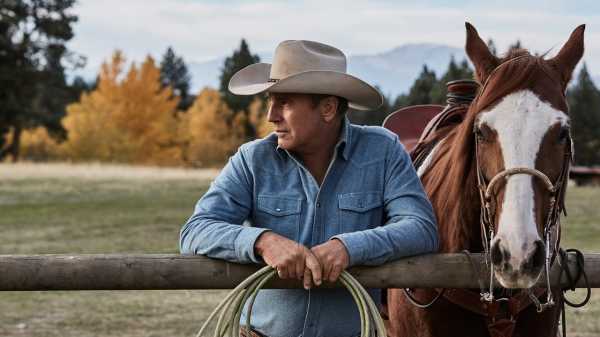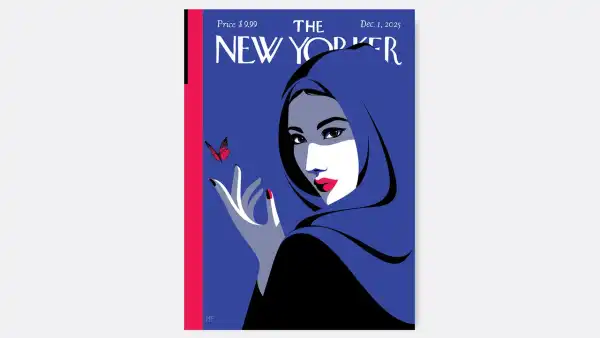
At home on the range, and within his acting range of hale virility, Kevin Costner plays John Dutton on “Yellowstone” (airing Wednesdays on the Paramount Network), a series that begins as a ponderous horse opera and develops into a somewhat preposterous soap opera. Dutton owns the largest cattle ranch in Montana, and he runs the state’s livestock commission, and also he is literally in bed with the governor (Wendy Moniz)—tenderly so, while shouldering a decades-old burden of grief for his wife, who died long enough ago that Gretchen Mol seems an age-appropriate partner in a flashback to Mrs. Dutton’s melodramatic demise.
“Yellowstone” offers Dutton as an unstable amalgam of frontiersman and Mob boss. He is both corrupt and pure, a dynastic potentate in a helicopter and a solitary cowpuncher in the saddle. A devoted patriarch, he is also, with his varnish of murderous darkness, an incarnation of rancid patriarchy. Costner delivers Dutton’s threats, pleas, and cowboy poesy in a rasp. He wears a leathery tan. The general impression is one of a vintage Costner performance—one hailing from the era when he attracted comparisons to Gary Cooper—that has been dry-aged, or perhaps cured and smoked, and, in any case, infused with a general essence of prestige-TV antiheroism.
Dutton belongs to the landscape, and the relationship, as depicted by the series’ creator, Taylor Sheridan, is mutually possessive. The show shares the Dutton family’s contempt for outsiders—vacationing city folks, interloping transplants, and a zillionaire property developer troubling its backyard with opulent sprawl—to the degree that I wonder if it resents me for enjoying its vistas of the large land under the big sky.
Dutton has four grown kids. One son, Jamie (Wes Bentley), is a lawyer with political ambitions and inexplicable sideburns; his father seeks his counsel regarding conflicts with a newly elected Indian chief (Gil Birmingham), among other power brokers. Another son, Lee (Dave Annable), is, in terms of Corleone family dynamics, the Fredo of the group—but a noble Fredo, his fatal weakness being a soft-hearted scarcity of broad-view business sense. He has the heart of a true cowboy but lacks the cunning of a cattleman.
The third son is Kayce (Luke Grimes). Estranged from the family, he lives on an Indian reservation, and right at the edge of uneasy-making thematic territory, with his dutiful Native American wife and their annoyingly precocious son. But he comes back in the fold. (“What are you doing here?” a sibling asks. “Closure, I guess,” he answers.) Kayce has a talent for whispering to mustangs, a skill which, despite its lavishness of figurative import, has not proved terribly lucrative. He is also a decorated war veteran—and his sainthood is indivisible from his proficiency as a killing machine. Three episodes in, his body count stands at four: two wicked souls extinguished in a seeming act of justice; one sad life ended in an act of mercy; and one man killed in what John would call a proof of loyalty and what the authorities would, at the very least, call manslaughter.
The Dutton machine grinds into action to see that Kayce remains a free man. John’s right-hand ranch hand, Rip Wheeler (Cole Hauser), handles all of the nastiest business and some of the more risible plot points. In his downtime, Rip serves as a plaything for Dutton’s daughter, Beth (Kelly Reilly), a Salt Lake City businesswoman who has beamed in from a more feverish series, where she subsists on martinis, prescription pills, and her suitors’ egos. With a mouthful of taunts, Beth invites Rip for a midmorning quickie atop a dressing table. Postcoitally, he asks if she’d like to go to a music festival, and she smacks him for spoiling the moment with his sentimentality. It is agreed that a more suitable plan for a date would be to get drunk and watch wolves kill an elk, which proves fun, even when Beth charges out of her Mercedes to howl at the wolves.
“Yellowstone” gives the sensation that Beth is a wild horse in need of breaking. The regressive tilt of the show’s sexual politics is, if nothing else, consistent with its outlook as a text about masculinity. It valorizes cowboy toughness and grows wistful when pondering man’s alienation from nature. “Cities are the sunsets of civilizations,” John says. Maybe he’s right. Certainly, he is nostalgic for Marlboro machismo.
Sourse: newyorker.com






